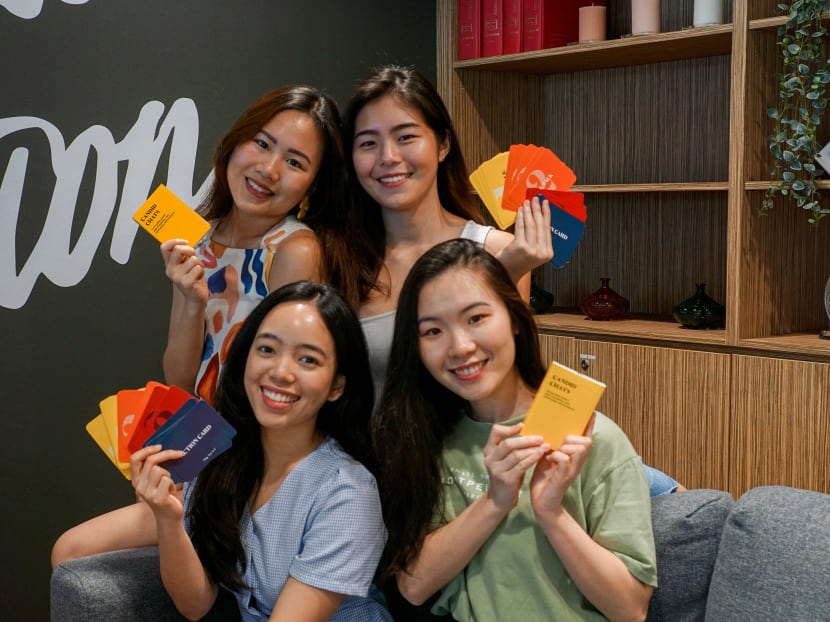Gen Y Speaks: This is what I am doing to tackle the menace of online sexual groomers
A study conducted by Microsoft last year found that 68 per cent of youths aged 13 to 17 in Singapore receive unwanted sexual content online, with 45 per cent of them approached by strangers — both of which are higher percentages than the global average. I find the numbers alarming, and think that we should raise greater awareness of the dangers of online sexual grooming.

The author (top right) started a campaign against online sexual grooming with three 24-year-old friends: Ms Vanessa Tan (top left), Ms Vinice Yeo (bottom left) and Ms Stephanie Wong, two of whom have had encounters with groomers. They are holding a card game that helps youths talk about their online experiences.
“What kids are facing is truly a cyber pandemic,” said Dr Yuhyun Park, founder of the DQ Institute which compiled the inaugural Child Online Safety Index, referring to the dangers of online activity for children, including hacking, cyber bullying and unwanted contact of a sexual nature.
I cannot agree more with her.
A study conducted by Microsoft last year found that 68 per cent of youths aged 13 to 17 in Singapore receive unwanted sexual content online, with 45 per cent of them approached by strangers — both of which are higher percentages than the global average.
I find the numbers alarming, and think that we should raise greater awareness of this matter.
In August last year, a friend shared that her close friend, Kylie*, had dated a 23-year-old guy when she was just 15.
Her friends cautioned Kylie about the eight-year age gap but she got upset. She believed Alex* when he said that age is just a number, and that her friends were trying to come between them. (*not their real names) He was one step ahead of them.
A few months on, Kylie’s outgoing personality took a 180-degree turn. She became quieter and more reserved. Her friends later discovered that he had been touching her inappropriately.
She broke down and revealed that she had been so stressed over the need to “return his affections towards her”.
Alex had guilt-tripped her into giving him sexual favours by questioning her trust and affection whenever she was reluctant.
“The age gap and emotional isolation was such a red flag but I didn’t know what to make of it at that time,” my friend told me.
“We were never taught about emotional and sexual grooming in school or by our parents,” she added.
“I still blame myself. I think the way we cautioned Kylie made her feel judged. It closed her off to sharing about Alex and she was touched repeatedly because there was no one she could turn to.”
Ever since I downloaded my first social media application in Primary 5, I’ve been on the receiving end of countless explicit messages from brazen netizens.
My go-to rule was just to block and report the matter to social media platforms whenever things didn’t seem right.
But I never knew how easy it was for someone to be groomed without any warning signs being evident.
I thought grooming was an overt, desperate attempt to hit on someone in a sexual way. I couldn’t have been more wrong.
Online child grooming is defined as a planned predatory action where a predator forms a trusting and emotional relationship with the goal of sexually exploiting a child.
In other words, it is an extremely complex and intricately planned strategy — starting from friendship, to a relationship and then exploitation.
Groomers typically do their due diligence to profile their targets: Which school do you attend? Who are your closest friends? What are your interests? What makes you vulnerable?
Potential victims could be feeling overwhelming stress from examinations or emotional insecurities or some family problems.
The groomers know how to suss these out and to use them to their advantage. More often than not, they are able to build a certain level of emotional connection and trust, such that victims willingly turn a blind eye to sexual advances in order to sustain the relationship.
Such emotional exploitation for one’s sexual gains is utterly damnable and I cannot imagine the nightmares victims face.
What makes grooming so dangerous is that every groomer has his own unique method of predation. There is no “one style fits all” and that makes detection very challenging.
Anyone could be a target of grooming and you may not know it when it hits.

One thing I know for sure is that Kylie’s grooming encounter is one too many and I want to do something to tackle this problem.
This is why at the beginning of this year, along with three friends — two of whom have had direct or indirect encounters with groomers — I started a campaign called Flag, You’re It.
As Singapore’s first holistic movement against online child grooming, we hope to encourage youths to flag online friendships or conversations to a trusted peer for a second opinion.
We want to build a supportive community where individuals are educated on the dangers of grooming, especially with children spending more time at home due to Covid-19 and getting more screen time than before.
Beyond putting out toolkits and video series on Instagram and Facebook, we also launched an interactive exhibition, 45 Minutes in The PreyGround , that immerses visitors into the key stages of grooming.
We are also developing a digital toolkit which we hope to distribute to schools.
But we are not stopping at education. We have established partnerships with stakeholders within the social, education, technology and regulatory sectors to activate ground-up and top-down initiatives simultaneously.
Besides linking adolescents with social organisations such as Touch Cyber Wellness for counselling, we also distributed resources to the Ministry of Education for cyber wellness lessons and served as a communication arm for tech giants and regulatory firms to educate youths on how to protect themselves online.
We recognise that there is a need for open and honest conversations on online friendships, intimacies, manipulation and emotional boundaries as youths may not readily want to discuss such topics due to existing stigma.
One initiative is Candid Chats, a card game that encourages youths to open up about their online experiences through three levels of dialogue — small talk, real talk and heart-to-heart talk.
Online friendships are nothing new but not all of them come with good intentions.
It is for this reason that we hope to encourage friends to start talking about their personal encounters online and at the same time become each other’s red flag detector.
Last words to all groomers out there: Don’t prey where we play. Otherwise, be prepared to face the music and the law.
ABOUT THE AUTHOR:
Esther Soh, 23, has just completed a four-year degree programme at the Wee Kim Wee School of Communication Studies and Information, Nanyang Technological University.









